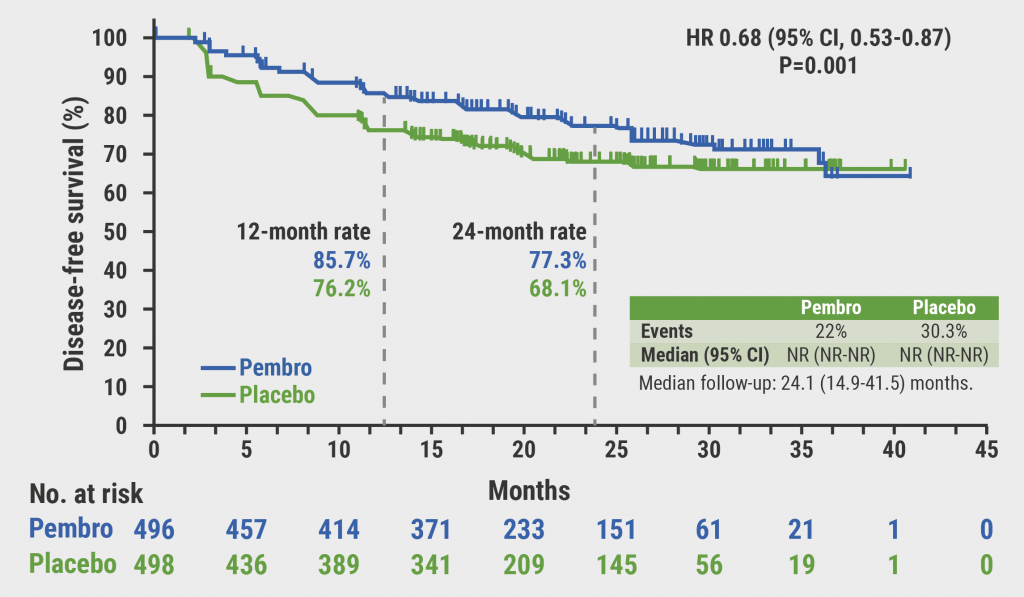Deregulated cellular metabolism is a key hallmark of cancer, in particular for tumours harbouring KEAP1/NFE2L2 mutations or those expressing low Asparagine Synthetase (ASNS) levels, leaving these tumours subject to glutaminolysis for bioenergetics. GLS1 is a key enzyme in glutaminolysis, converting glutamine into glutamate.
IACS-6274 is a potent oral GLS1 inhibitor with excellent pharmacokinetics and anti-tumour activity in biomarker-defined preclinical models. Dr Timothy Yap (MD Anderson Cancer Center, TX, USA) presented the results of a phase 1 trial (NCT03894540) of IACS-6274 in patients with molecularly selected advanced solid tumours [1]. Primary endpoints were safety and tolerability, maximum tolerated dose, and recommended phase 2 dose. One secondary endpoint was preliminary anti-tumour activity.
The trial enrolled 22 patients with advanced ovarian cancer (n=8), non-small cell lung cancer (n=7), melanoma (n=2), gastric cancer, anal cancer, endometrial cancer, leiomyosarcoma, and head and neck squamous cell carcinoma (all n=1). Molecular alterations assessed included ASNS loss (n=6), STK11 (n=5), KEAP1 (n=5), NFE2L2 (n=4), and NF1 (n=1). A total of 12 patients had 2–4 prior lines of therapy, 10 patients had ≥5. Patients received IACS-6274 at escalating doses ranging from 20–240 mg twice daily.
The most common grade 1-2 treatment-related adverse events were very transient photophobia and photopsia, observed mainly at the highest doses of 180 mg and 240 mg. Grade 3-4 treatment-related toxicities were mainly seen at the dose of 240 mg (i.e. acute renal failure, nausea, hypokalaemia, hypertension, PRES syndrome, and seizures, all of which fully resolved). Glutamate to glutamine ratios decreased in plasma samples in patients at day 14. Compared with baseline, patients at doses of 120, 180, and 240 mg had inhibition of 82.5% (P<0.0001), 83.9% (P<0.0001), and 85.3% (P<0.0001), respectively. The recommended phase 2 dose was 180 mg twice daily. Best response was stable disease in 17 of 20 evaluable patients. Disease control rate at 12 weeks was 60%. Durable stable disease for more than 6 months was observed in 6 patients (2 patients with advanced ASNS-loss ovarian cancer, 2 patients with PD1 inhibitor-resistant melanoma, 1 patient with NF1-mutant leiomyosarcoma, and 1 patient with STK11-mutant non-small cell lung cancer).
- Yap TA, et al. First-in-human biomarker-driven phase I trial of the potent and selective glutaminase-1 (GLS1) inhibitor IACS-6274 (IPN60090) in patients (pts) with molecularly selected advanced solid tumours. Abstract 3001, ASCO 2021 Virtual Meeting, 4–8 June.
Copyright ©2021 Medicom Medical Publishers
Posted on
Previous Article
« Circulating tumour DNA to evaluate response in children with neuroblastoma Next Article
Long-term results from ground-breaking melanoma trials »
« Circulating tumour DNA to evaluate response in children with neuroblastoma Next Article
Long-term results from ground-breaking melanoma trials »
Table of Contents: ASCO 2021
Featured articles
Downloadable 1-Page Editor-Selected Trial PowerPoint Slides
Breast Cancer
Excellent prognosis for breast cancer patients with ultra-low-risk gene signature
Olaparib benefits early breast cancer patients with BRCA1/2 germline mutation
Platinum-based adjuvant chemotherapy in TNBC is not superior or non-inferior to capecitabine
Dalpiciclib benefits patients with HR-positive, HER2-negative advanced breast cancer
Trastuzumab-deruxtecan showed clinical activity in patients with brain metastases
Lung Cancer
Neoadjuvant nivolumab plus chemotherapy improves surgical outcomes in NSCLC
Immune-related adverse events are associated with efficacy of atezolizumab in patients with advanced NSCLC
Sustained efficacy of nivolumab/ipilimumab plus 2 cycles of chemotherapy in NSCLC
Patritumab deruxtecan (HER3-DXd) in EGFR TKI-resistant NSCLC
Melanoma
Long-term results from ground-breaking melanoma trials
Novel dual checkpoint blockade improves progression-free survival in melanoma
Neoadjuvant therapy with nivolumab plus relatlimab is safe and effective in patients with stage III melanoma
Genitourinary Cancers
VISION trial shows improved survival with 177Lu-PSMA-617 in mCRPC
Abiraterone added to ADT + docetaxel nearly doubles survival in de novo mCSPC
Post-nephrectomy pembrolizumab improves disease-free survival
Glutaminase inhibitor telaglenastat does not improve survival mRCC
Promising efficacy and safety of feladilimab in recurrent/metastatic urothelial carcinoma
Gastrointestinal Cancers
Pembrolizumab benefits survival in MSI-H/dMMR metastastic colorectal cancer
Panitumumab added to 5-FU/LV effective as maintenance therapy in patients with mCRC
Trastuzumab-deruxtecan showed promising activity in patients with HER2-expressing mCRC
Benefit of both I-O/chemo combo and I-O/I-O combo over chemotherapy alone in oesophageal squamous cell cancer
Benefit of I-O/chemo combo over chemotherapy alone in advanced GC/GEJC/EAC
Perioperative chemotherapy and neoadjuvant multimodality therapy appear equally effective
Haematological Cancers
Olutasidenib demonstrates efficacy in patients with relapsed/refractory IDH1 mutant AML
Acalabrutinib as effective but better tolerated than ibrutinib in CLL
Gynaecological Cancers
Adjuvant chemotherapy does not improve outcome in patients with locally advanced cervical cancer
Novel drug combination for recurrent ovarian cancer
Dual HER2-blockade shows anti-tumour activity in patients with uterine cancer
Paediatric Cancer
Molecular tumour profiling impacts the diagnosis and treatment of solid tumours
Circulating tumour DNA to evaluate response in children with neuroblastoma
Basic Science
PARP7 inhibitor shows promising results in first-in-human trial
IACS-6274 is well tolerated and biologically active in selected advanced tumours
CYT-0851 shows promising anti-tumour activity across different tumour types
Related Articles

August 12, 2021
Post-nephrectomy pembrolizumab improves disease-free survival

© 2024 Medicom Medical Publishers. All rights reserved. Terms and Conditions | Privacy Policy
HEAD OFFICE
Laarderhoogtweg 25
1101 EB Amsterdam
The Netherlands
T: +31 85 4012 560
E: publishers@medicom-publishers.com

